 At first glance, a closed-door executive session of the Board of Elections at the Coffee County Courthouse in the battleground state of Georgia appeared to involve nothing more than discussion of that day's resignation letters from then-Election Supervisor Misty Hampton and her assistant over their purported cheating on timesheets.
At first glance, a closed-door executive session of the Board of Elections at the Coffee County Courthouse in the battleground state of Georgia appeared to involve nothing more than discussion of that day's resignation letters from then-Election Supervisor Misty Hampton and her assistant over their purported cheating on timesheets.
But the previously undisclosed, simultaneous presence of an unacknowledged quorum of County Commissioners at that executive session --- a secret meeting during a secret meeting, a game-changer confirmed by The BRAD BLOG --- combined with curious doth protest too much efforts the County is still using to defend its secrets about the supposedly humdrum assembly, indicate the February 25, 2021 meetings (now known as meetings plural) and surrounding events were the nexus of a much broader statewide, perhaps even nationwide, cover-up.
That night, the very same reputedly run-of-the-mill Thursday in February when the elections board gathered at the Courthouse, MyPillow founder and close Trump associate Mike Lindell --- a chief Stop the Steal bankroller --- landed his private jet in the county's tiny seat of Douglas, population 11,685. A few hours earlier, flight records show, he landed in D.C. A few hours before that, his plane took off from a runway not 15 miles from the private Mar-a-Lago club belonging to a certain twice-impeached Florida Man named Donald J. Trump. Why did Lindell fly so circuitously from the Palm Beach area to the nation's capital and then back down south to rural Coffee County, of all places?
And why did he want to speak with Misty Hampton, Coffee's resigning Election Supervisor? Evidence yielded from a years-long lawsuit by actual election experts challenging Georgia's Dominion voting system has revealed that the far-right bedding baron's lawyer, Kurt Olsen, tried to get ahold of Hampton the previous evening to talk, as word spread that she'd be dismissed the next day. Why would he want to do that?
Over the January prior to the unexplained meeting(s) --- in fact, beginning just the day after armed and violent Trump supporters assailed the U.S. Capitol in hopes of preventing Joe Biden's 2020 election victory --- a motley mix of mostly MAGA operatives illicitly entered the Coffee County elections building on multiple occasions. The breach was funded and organized by Trump attorney Sidney Powell, that prolific and since-sanctioned filer of failed lawsuits seeking to steal Biden's 2020 win.
One client of the breach-funding Powell, it turns out, was "fake elector" Cathy Latham, the former Coffee County GOP chair. Latham was found to have helped facilitate --- and to have lied about her presence during --- the breach at the elections office, where the invited intruders copied Dominion's proprietary software that is still to be used in the 2024 Presidential election in Georgia and numerous jurisdictions beyond.
Hampton, as director of elections for the Republican-leaning county, welcomed the Powell-paid team into the local elections office to have at the voting equipment, tabulators and sensitive election management systems.
With statewide voting systems gravely compromised by the ensuing breach --- Georgia Secretary of State Brad Raffensperger forces every county to use the same touchscreens, also employed in more than a dozen states nationwide --- and with traces of top Trumpers everywhere, the scandal is, as the county seat's Mayor Pro Tem recently put it, "only getting bigger."
Indeed, Atlanta-based District Attorney Fani Willis is reportedly investigating the Coffee County breach, along with Team Trump's multistate plot to gain access to and copy data from voting systems in other states as well. The scheme, as we have since learned, was hatched during a notorious December 2020 meeting in the Oval Office with Trump present. That fact came to light in testimony to the U.S. House subcommittee that investigated January 6th.
Frustrated, fighting back tears, Douglas Mayor Pro Tem Olivia Pearson, a lifelong Coffee resident and voting rights activist in the majority black seat of the majority white county, said at a recent gathering as the reality of the breach finally began galvanizing local residents, "We have got to make it right. We can't keep covering it up!"
Starting in earnest last month, local residents have increasingly attended the Board of Elections' open meetings, only to be told, more than once, by its unapologetic Chairman Wendell Stone --- who some locals are said to describe as "Chairman Stone(wall)" --- to stop asking questions.
Of course, that makes us want to ask many more questions about what really happened among the cows and cornstalks in the rural Peach State county. Such as: Why did Hampton and her assistant who helped facilitate the unlawful Trump/Powell/MAGA breach to illicitly copy and distribute Coffee County's sensitive voting system software actually tender their resignations on February 25, 2021?; Did local and state officials know about the breach and attempt to cover it up with secret meetings? What on Earth was Mike Lindell doing there for several hours that night?; And why has the office of Republican Secretary of State Brad Raffensperger, heralded by some as a 'moderate Republican' hero for not helping Trump steal the state's election in 2020, denied the severity of the breach and lied by both omission and commission to aid in covering it all up?
And, yes, all of this matters at the national level --- not only to the Coffee residents, who have lately found themselves in a fight they never asked for over their beloved county's soul...
'Increased risks' for the entire nation
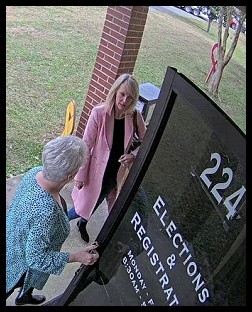 On New Year's Day 2021, Jennifer Jackson, an employee at Atlanta cyber forensics firm SullivanStrickler, received a typo-ridden text-message from Trump lawyer Katherine Friess referring to her recent D.C. meeting with Rudy Giuliani, onetime Trump attorney and former New York City Mayor.
On New Year's Day 2021, Jennifer Jackson, an employee at Atlanta cyber forensics firm SullivanStrickler, received a typo-ridden text-message from Trump lawyer Katherine Friess referring to her recent D.C. meeting with Rudy Giuliani, onetime Trump attorney and former New York City Mayor.
"Hi! Just handed back in DC with the Mayor. Huge things starting to come together!" the misspelled message began. "Most immediately," Friess continued, "we were granted access --- by written invitation! --- to the Coffee County Systens. Yay!" Jackson, along with other supposed computer experts from SullivanStrickler would, about a week later, breach the Coffee elections building for what their invoice to Sidney Powell would term "Voting Machines Analysis."
However, no such written invitation as Friess mentions has yet materialized. Coffee Elections Board Chair Wendell Stone testified under oath in a deposition that on "behalf of the Board, no authority was granted to examine our systems, our computers, our data."
Friess' celebratory text to Jackson, and Stone's apparent denial, both surfaced in Curling v. Raffensperger, an ongoing court case launched in July 2017. The plaintiffs demand Georgia's Secretary of State Raffensperger replace his new, unverifiable $150 million polling place touchscreen systems with hand-marked paper ballots tabulated by robustly audited optical scanners. Many cybersecurity and voting system experts agree the change would dramatically improve election integrity and security. They had, in fact, strongly urged Raffensperger to move to such a system after the federal judge in the Curling case found Georgia's previous touchscreen systems too vulnerable to ever use again after 2019.
News stories over the past year --- including by major corporate media outlets --- have detailed the security camera surveillance footage and other evidence documenting the Jan. 7 through Jan. 29 illicit entrances at the Coffee County elections building in 2021. As the stunning transgressions gradually came to light, the Curling plaintiffs used them in federal court as an object lesson in the gaping vulnerabilities plaguing Georgia's new, replacement touchscreen systems.
In the words of one of the plaintiffs' computer security experts, Kevin Skoglund, in his sworn December 2022 declaration, the intruders collected and distributed "protected software from almost every component of Georgia's election system." Now, he warns, "adversaries may use the software in disinformation campaigns or study it to learn how to subvert its operation." As a result, he added, "all of Georgia's counties and other states must endure increased risks."
Examination of the breach makes it impossible to interpret the activities as anything other than a flagrant violation of Georgia law, as Fulton County District Attorney Fani Willis appears to have noticed. Furthermore, the matter has cast a dark, looming cloud over the 2024 election in both Georgia and other states where the same sensitive equipment will be used again next year. In Georgia, the systems are scheduled for use without critical security patches strongly recommended by the U.S. Cybersecurity and Infrastructure Security Agency (CISA). Raffensperger's office recently told the federal judge in Curling that Dominion's certified upgrades will not be installed in the swing-state until after next year's Presidential election. Cybersecurity experts have said such a delay in patching security holes now gives potential attackers 18 months to exploit vulnerabilities spilled due to the Coffee breach.
Then-election supervisor Misty Hampton was there in Coffee County, complicit, every single day of the criminal breach. Roughly a month later, when Mike Lindell's lawyer was texting her to schedule a chat, Hampton also received a separate text from Board of Elections member Matthew McCullough.
McCullough told Hampton (and others on the Board's group-text) that County Attorney Tony Rowell requested "discussing any conversations about elections with him first," adding: "we have another new lawsuit and the possibility of another after that."
New and potential litigation was on their minds the day before the next afternoon's still-mysterious February 25, 2021 meeting(s). As far as lawsuits are concerned, however, the published minutes for the meeting refer only to a need to go into a closed-door executive session to discuss as-yet unexplained "PENDING OR POTENTIAL LITIGATION, SETTLEMENT, CLAIMS, ADMINISTRATIVE PROCEEDINGS, OR OTHER JUDICIAL ACTIONS BROUGHT OR TO BE BROUGHT BY OR AGAINST THE COUNTY."
The meeting was properly and publicly noticed in advance, and elections board Members assembled on Feb. 25, 2021, though not in their usual spot, the elections building. Instead, they gathered in the County Commissioners meeting room on the County Courthouse's ground floor.
Among the members present was Eric Chaney, who had participated in the January breach and ultimately resigned from the Board of Elections in August 2022. Under oath in a Curling v. Raffensperger deposition three days following his resignation, he oddly explained he'd stepped down abruptly because he'd moved from one district to another. That's not a reason that would mandate he quit.
Chaney invoked the Fifth Amendment during his deposition just shy of 250 times, despite being warned early on that citing the Fifth in the civil, not criminal, proceeding meant the court could infer such statements undermine him. The warning was prompted by Chaney pleading "Fifth Amendment" when asked to confirm if he'd destroyed all his communications with Misty Hampton. Elections officials, including Chaney and Hampton, have a legal duty to preserve all such correspondence related to their election roles.
In fact, the Board now claims to have lost all of Hampton's emails and those of her assistant. All of them.
That's about where matters lay by last summer. The secretive gathering --- purportedly to discuss Hampton and her assistant's mere timesheet discrepancies and/or something litigation related --- remained a black hole, with little light of knowledge escaping what the Douglas Mayor Pro Tem would this month call a cover-up.
Shadowy meeting. Missing documentation.
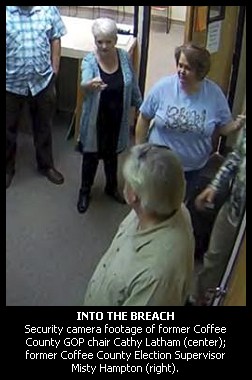 Public minutes for the Feb. 25, 2021 meeting not produced and signed until Oct. 2022, over a year and a half later, when the nonprofit Coalition for Good Governance, a plaintiff in Curling v. Raffensperger, successfully demanded them from the County. In retrospect, the concise document, just 200-ish words in length, serves as a sign that Misty Hampton's timesheets were little more than an attempted smokescreen.
Public minutes for the Feb. 25, 2021 meeting not produced and signed until Oct. 2022, over a year and a half later, when the nonprofit Coalition for Good Governance, a plaintiff in Curling v. Raffensperger, successfully demanded them from the County. In retrospect, the concise document, just 200-ish words in length, serves as a sign that Misty Hampton's timesheets were little more than an attempted smokescreen.
The tardy minutes say little more than that the Board of Elections went into a closed-door executive session, meaning they granted themselves secrecy.
According to the public minutes, the Board cloaked their conversation for two reasons permitted under certain circumstances: employment and litigation. The first --- deliberating on dismissal or disciplinary matters --- presumably refers to Hampton and her assistant's resignations. The second, the sole other purpose given in the belated minutes for executive secrecy, was to consult with County Attorney Tony Rowell --- who is documented as being present at the meeting --- about pending/potential litigation.
It seems implausible that the "new lawsuit and the possibility of another" that Matthew McCullough referred to in the Board of Elections group-text the night before revolved around dismissing Hampton due to purported timesheet cheating. So what was the incoming litigation really about in that month following the Coffee County voting software breach? And who had threatened or brought it?
To speculate, ponder the interests of Secretary of State Raffensperger's office or Dominion Voting Systems, either or both of which, if they'd learned of the January breach, could have pressured the Coffee elections body on pain of a lawsuit.
Georgia's embattled elections chief might have demanded Coffee County turn over --- or conceal --- some bit of evidence, maybe to preemptively gain some control over the potentially embarrassing or discrediting story before it hit any headlines. We reached out to Raffensperger's office and will update if answered. So far, although their website continues trumpeting "secure" elections, they aren't talking.
Dominion, despite their longstanding silence on the topic of their sensitive, proprietary, and highly vulnerable voting systems being breached, copied, and distributed via the Internet, has stubbornly refused to produce related public records. A spokesperson's boilerplate response revealed little sign of concern for the obvious risk of massive reputational damage to their systems nationwide.
To date, speculation is all that's possible. Coffee County has yet to publicly identify the purported litigation referenced by the text-message or public minutes, even though the Association of County Commissioners of Georgia (ACCG) guide to open meetings cites case law to say "mere fear or suspicion of being sued" isn't enough to justify executive session secrecy --- instead, to use a legal threat as a basis for cloaking conversations, a board must be able to produce tangible proof, such as a written demand letter, of the pending/potential litigation in question.
Marilyn Marks, the Executive Director of the Coalition for Good Governance, told us the County has yet to produce a tangible lawsuit threat matching both McCullough's Feb. 24, 2021 group-text about a "new lawsuit and the possibility of another" and use of litigation in the belated minutes as the justification for executive session secrecy.
Our review of scores of emails between the nonprofit watchdog organization and County attorney Jennifer Herzog --- constituting open records requests and her official responses --- demonstrates the Coffee County Board of Elections failed and continues to fail in its legal duty to correctly document the shadowy Courthouse meeting.
For the secretive gathering, the elections board has produced only terse and cryptic public minutes, even though Georgia open meetings law mandates a Board must record minutes for executive sessions as well, even if they remain unpublished, so a judge may review them confidentially if need be. The body must similarly "execute and file with the official minutes a notarized affidavit" when asserting executive secrecy, describing "the reason for closing the meeting and swearing that the meeting was limited to the topics allowed by law."
In response to a Coalition records requests this year, Attorney Herzog wrote on April 28: "I am not aware of any executive session minutes in existence at this time."
Herzog's response regarding the affidavit was just as bad. Formally asked by the nonprofit watchdog to produce the legally-mandated notarized attestation for the Feb. 25, 2021 executive session at the courthouse, Herzog answered on March 24 of this year that it was her "understanding there are no records in Coffee County's possession responsive" to that request. She added that she was not "aware of any [responsive] documents" held by her law firm, Hall Booth Smith, a major outfit with more than 400+ attorneys nationwide.
The absent executive minutes, apparently nonexistent notarized affidavit, and missing tangible proof of legal threats --- which, if published, would identify any powerful players who were making demands of the County --- combine to argue that the shadowy meeting's executive session was illegitimate (a nice way of saying illegal), and that the Board of Elections thereby owes everyone new, correct minutes documenting what really happened.
Cracking a cover-up's wall of secrecy?
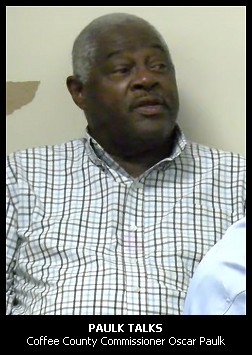 The BRAD BLOG has now uncovered and confirmed with several members present at the secretive meeting that Coffee County has yet another problem. Namely, that the tardy minutes are lies since they include no mention that the Board of Elections was joined that day at the Courthouse by a quorum of County Commissioners --- the county's governing authority.
The BRAD BLOG has now uncovered and confirmed with several members present at the secretive meeting that Coffee County has yet another problem. Namely, that the tardy minutes are lies since they include no mention that the Board of Elections was joined that day at the Courthouse by a quorum of County Commissioners --- the county's governing authority.
That quorum officially constituted a public meeting of that body as well, a public meeting which is also required, under law, to be publicly noticed in advance and recorded via official minutes.
No public notice announced the County Commissioners meeting within a meeting. Official minutes are nowhere to be found. In fact, County Attorney Herzog maintains that no quorum of Commissioners met!
Earlier this month, on June 4, after months of tight-lipped officials in Coffee refusing to go on record about what actually happened at that February 2021 meeting, Oscar Paulk, the only black member of Coffee's County Commission, finally confirmed to us that he did, in fact, attend the Feb. 25, 2021 elections board meeting.
Word of Paulk's confirmation quickly made its way around. At a public meeting of the Board earlier this month, on June 6, 2023 --- just two days after we were able to confirm the first crack in the Commissioners' wall of secrecy --- Georgia activist Kathryn Grant asked if anyone besides Paulk remembered Commissioners attending the Feb. 25, 2021 Board of Elections executive session. No one spoke up. Chairman Wendell Stone stonewalled as follows: "We're not accepting questions. The Board is not accepting questions. I am not accepting questions."
Nevertheless, she persisted, and Stone man-terrupted: "We're not accepting questions. And please don't pose another question."
In fact, Paulk had confirmed that a trio of County Commissioners --- himself, A.J. Dovers and Ted O'Steen --- did, in fact, attend the elections board's session at the Courthouse that day.
The admissions did not come easily, some 28 months after the meeting took place. Two Board of Elections members, likewise on record, and only after this month's June 6 meeting, confirmed Paulk's admission. Ernestine Thomas-Clark --- the sole black member of the board, who votes a Democratic ballot --- confirmed to us on June 7. Air Force veteran Andy Thomas similarly confirmed it to us the next day. (Despite the similar surnames, there's no relation between the two.)
Yes, an official quorum of County Commissioners attended the shadowy Board of Elections meeting. Why? And why were the other two Commissioners not there?
Georgia's legislation enabling the Coffee County Board of Commissioners states that "three board members shall constitute a quorum." The ACCG's legal guide spells out the significance: "Meetings that must comply with the open meetings law include the gathering of a quorum of a board of commissioners...at which any official business, policy, or public matter of the county is formulated, presented, discussed, or voted upon."
The meeting was, in fact, official business. Oscar Paulk told us, also on June 4, that the Board of Elections invited the County Commissioners with the purpose of discussing, on Feb. 25, 2021, Misty Hampton and "what to do about her." In response, the Commissioners, as Paulk tells it, presented their view that the fate of the then-Election Supervisor was a decision for the elections board to formulate. But why were eight senior members of County government --- plus the County Attorney --- present for what one source described as a "task more fitting for the Human Resources staff"?
Mundane HR matter or not, the presence of three Commissioners listening to the five-person elections body decide upon a governmental employment matter certainly fits "a quorum of a board of commissioners at which...official business...[is] discussed." That's true even if the County Commissioners' quorum was brief and quick to wash their hands of the subject --- though to be clear, that hasn't been established.
In other words, it wasn't one board of officials assembling at the Courthouse that day, it was two. A secret meeting within a secret meeting.
With a quorum of Commissioners, statutory transparency obligations kick in: the Coffee County Board of Commissioners legally owes everyone public minutes documenting exactly what took place at the long-ago meeting. The Coffee Board of Elections must correct their existing public minutes as well. The two concurrent meetings had at least some significant duration of overlap, and possibly started and ended at the same or nearly the same time (or not). If litigation against the County was discussed, the public has the right to know who threatened to sue Coffee County --- whether the Secretary of State's office, Dominion Voting Systems, or other entities entirely --- and how the matter was resolved.
Did the threatened litigation relate to the January elections building breaches, then still a tightly held secret?
Still more questions than answers
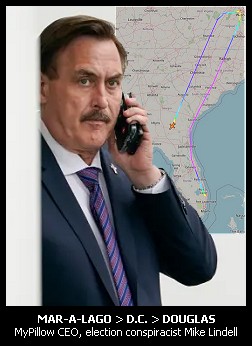 Seeking details on the Commissioners quorum revelation, we asked County Attorneys Jennifer Herzog and Tony Rowell for comment. Our repeated messages went unanswered. So did our multiple requests for comment sent to every current Commissioner besides Oscar Paulk and every current Board of Elections member other than Andy Thomas and Ernestine Thomas-Clark.
Seeking details on the Commissioners quorum revelation, we asked County Attorneys Jennifer Herzog and Tony Rowell for comment. Our repeated messages went unanswered. So did our multiple requests for comment sent to every current Commissioner besides Oscar Paulk and every current Board of Elections member other than Andy Thomas and Ernestine Thomas-Clark.
As the freshly cracking wall of secrecy surrounding that Thursday assembly 28 months ago at the Coffee County Courthouse continues to crumble, we may come to understand better the myriad links between relevant parties, such as top Trumpers, corporate voting vendors, high-powered and profoundly conflicted "local" lawyers, leading Georgia state election officials and those on the ground in Coffee County, including the public asking what happened in their home county and what should be done about it.
Where did this apparent cover-up begin? Where does it end? We will keep digging.
In the meantime, if you happen to see MyPillow CEO Mike Lindell, ask him what he was doing late that night at Coffee county's airport in Douglas, Georgia, right after visiting the nation's capital and Donald Trump's private club, will ya? After all, he'd been photographed the month prior heading into the White House, just a week after the Jan. 6 auto-coup attempt, carrying notes mentioning Sidney Powell --- funder of the unprecedented Coffee County voting system breach --- and citing the Insurrection Act, a legal basis, in certain unhappy circumstances, for declaring martial law.
That seems important.
Originally from Texas, Douglas Lucas is a Seattle-based freelance writer/journalist, content marketer, and substitute teacher in public education. Besides speaking at a Buffalo, New York anarchist bookstore in 2017, he has reported from the trials of several federal defendants in the hacktivism/transparency movement, turned internal memos hacked out of the spy firm Stratfor into carefully researched stories, and appeared as an expert on the same in the documentary film The Hacker Wars. Visit his website, follow him on Twitter, or admire his houseplants on Instagram.


 Vets Push Back at Trump, Musk Plan to Slash Health Care, 80K V.A. Jobs: 'BradCast' 3/27/25
Vets Push Back at Trump, Musk Plan to Slash Health Care, 80K V.A. Jobs: 'BradCast' 3/27/25 'Green News Report' 3/27/25
'Green News Report' 3/27/25
 Signal Scandal Worsens for Trump, GOP; Big Election Victories for Dems in PA: 'BradCast' 3/26/25
Signal Scandal Worsens for Trump, GOP; Big Election Victories for Dems in PA: 'BradCast' 3/26/25 'Emptywheel' on Why Trump NatSec Team Should 'Resign in Disgrace' After Signal Chat Debacle: 'BradCast' 3/25/25
'Emptywheel' on Why Trump NatSec Team Should 'Resign in Disgrace' After Signal Chat Debacle: 'BradCast' 3/25/25 'Green News Report' 3/25/25
'Green News Report' 3/25/25 Postal Workers Union Prez: USPS 'Belongs to the People, Not the Billionaires':
Postal Workers Union Prez: USPS 'Belongs to the People, Not the Billionaires': Sunday 'Suddenly Conceivable' Toons
Sunday 'Suddenly Conceivable' Toons We're ALL Voice of America Now: 'BradCast' 3/20/25
We're ALL Voice of America Now: 'BradCast' 3/20/25 'Green News Report' 3/20/25
'Green News Report' 3/20/25 What Trump's 'Timber Production Expansion' Means (and Costs): 'BradCast' 3/19/25
What Trump's 'Timber Production Expansion' Means (and Costs): 'BradCast' 3/19/25 Courts Largely Holding Against Trump, Musk Lawlessness: 'BradCast' 3/18/25
Courts Largely Holding Against Trump, Musk Lawlessness: 'BradCast' 3/18/25 'Green News Report' 3/18/25
'Green News Report' 3/18/25 Chief VOA Reporter on Outlet Falling Silent First Time Since 1942: 'BradCast' 3/17/25
Chief VOA Reporter on Outlet Falling Silent First Time Since 1942: 'BradCast' 3/17/25 Sunday 'The Usual' Toons
Sunday 'The Usual' Toons 'Green News Report' 3/13/25
'Green News Report' 3/13/25 Trump EPA Unveils Plans to Endanger, Sicken Americans: 'BradCast' 3/13/25
Trump EPA Unveils Plans to Endanger, Sicken Americans: 'BradCast' 3/13/25 Trump Nixed Enforce-ment Against 100 Corp. Lawbreakers: 'BradCast' 3/12/25
Trump Nixed Enforce-ment Against 100 Corp. Lawbreakers: 'BradCast' 3/12/25 Bad Day for 'Strongmen': 'BradCast' 3/11
Bad Day for 'Strongmen': 'BradCast' 3/11 WI Election Could Flip Supreme Court Control, Musk Jumps In: 'BradCast' 3/10
WI Election Could Flip Supreme Court Control, Musk Jumps In: 'BradCast' 3/10 'What Else Could a Russian Asset Do That Trump Hasn't?': 'BradCast' 3/6/25
'What Else Could a Russian Asset Do That Trump Hasn't?': 'BradCast' 3/6/25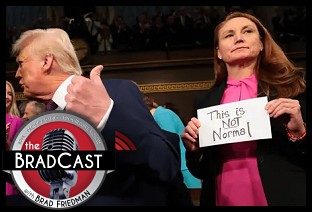 The Longest, Dullest, Most Lie-Filled 'SOTU' Ever: 'BradCast' 3/5/25
The Longest, Dullest, Most Lie-Filled 'SOTU' Ever: 'BradCast' 3/5/25 Trump Bad for Biz... and Farmers... and Nat'l Parks... and...: 'BradCast' 3/4/25
Trump Bad for Biz... and Farmers... and Nat'l Parks... and...: 'BradCast' 3/4/25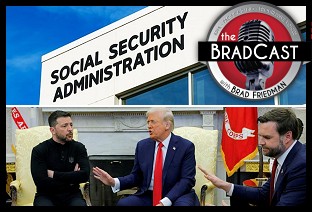 Trump Targeting 50% Cuts, Office Closures at Social Security: 'BradCast' 3/3/25
Trump Targeting 50% Cuts, Office Closures at Social Security: 'BradCast' 3/3/25
 VA GOP VOTER REG FRAUDSTER OFF HOOK
VA GOP VOTER REG FRAUDSTER OFF HOOK Criminal GOP Voter Registration Fraud Probe Expanding in VA
Criminal GOP Voter Registration Fraud Probe Expanding in VA DOJ PROBE SOUGHT AFTER VA ARREST
DOJ PROBE SOUGHT AFTER VA ARREST Arrest in VA: GOP Voter Reg Scandal Widens
Arrest in VA: GOP Voter Reg Scandal Widens ALL TOGETHER: ROVE, SPROUL, KOCHS, RNC
ALL TOGETHER: ROVE, SPROUL, KOCHS, RNC LATimes: RNC's 'Fired' Sproul Working for Repubs in 'as Many as 30 States'
LATimes: RNC's 'Fired' Sproul Working for Repubs in 'as Many as 30 States' 'Fired' Sproul Group 'Cloned', Still Working for Republicans in At Least 10 States
'Fired' Sproul Group 'Cloned', Still Working for Republicans in At Least 10 States FINALLY: FOX ON GOP REG FRAUD SCANDAL
FINALLY: FOX ON GOP REG FRAUD SCANDAL COLORADO FOLLOWS FLORIDA WITH GOP CRIMINAL INVESTIGATION
COLORADO FOLLOWS FLORIDA WITH GOP CRIMINAL INVESTIGATION CRIMINAL PROBE LAUNCHED INTO GOP VOTER REGISTRATION FRAUD SCANDAL IN FL
CRIMINAL PROBE LAUNCHED INTO GOP VOTER REGISTRATION FRAUD SCANDAL IN FL Brad Breaks PA Photo ID & GOP Registration Fraud Scandal News on Hartmann TV
Brad Breaks PA Photo ID & GOP Registration Fraud Scandal News on Hartmann TV  CAUGHT ON TAPE: COORDINATED NATIONWIDE GOP VOTER REG SCAM
CAUGHT ON TAPE: COORDINATED NATIONWIDE GOP VOTER REG SCAM CRIMINAL ELECTION FRAUD COMPLAINT FILED AGAINST GOP 'FRAUD' FIRM
CRIMINAL ELECTION FRAUD COMPLAINT FILED AGAINST GOP 'FRAUD' FIRM RICK SCOTT GETS ROLLED IN GOP REGISTRATION FRAUD SCANDAL
RICK SCOTT GETS ROLLED IN GOP REGISTRATION FRAUD SCANDAL VIDEO: Brad Breaks GOP Reg Fraud Scandal on Hartmann TV
VIDEO: Brad Breaks GOP Reg Fraud Scandal on Hartmann TV RNC FIRES NATIONAL VOTER REGISTRATION FIRM FOR FRAUD
RNC FIRES NATIONAL VOTER REGISTRATION FIRM FOR FRAUD EXCLUSIVE: Intvw w/ FL Official Who First Discovered GOP Reg Fraud
EXCLUSIVE: Intvw w/ FL Official Who First Discovered GOP Reg Fraud GOP REGISTRATION FRAUD FOUND IN FL
GOP REGISTRATION FRAUD FOUND IN FL


































